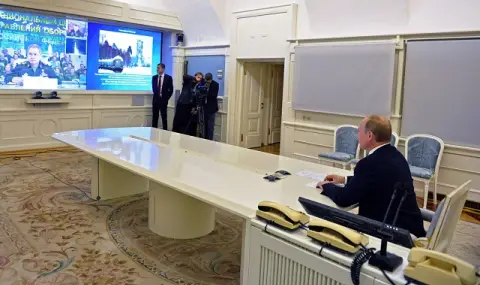Kremlin tries to downplay the threat of the unprecedented Ukrainian incursion into Kursk region, presenting it as a local force majeure problem similar to a natural disaster, writes Bloomberg, analyzing the latest actions and statements of the Russian authorities.
On Friday, President Vladimir Putin gathered Russia's top officials for a regular meeting of the Security Council. However, the central topic was not the first invasion of a foreign army in Russia in 80 years, but the "new technical decisions made during a special military operation".
The Russian media is also focusing its attention not so much on the Ukrainian invasion as such, but on the topic of humanitarian aid for the people affected by the events in the Kursk region. As Bloomberg notes, the Kremlin is actually trying to create the impression among Russians that the events in the Kursk region are somehow "normal", as if there is a large-scale flood or other natural disaster.
"The Kremlin does not want to send a message that the enemy is at the gates. They don't want to send a message about Ukraine's strength and their own weakness," believes Olga Oliker, director for Europe and Central Asia at the International Crisis Group in Brussels.
The Kremlin appears unwilling to even acknowledge the invasion. On Monday, for example, the press service of the Kremlin published a message that Putin discussed with senior officials "topical issues" about the "situation" on the border.
During one of those meetings, which was broadcast online, Putin abruptly interrupted the acting governor of the Kursk region, Alexei Smirnov, as he began to describe the scale of the Ukrainian actions. The president directed the governor to focus on helping refugees and leave military assessments to the Department of Defense.
Although anxiety among ordinary Russians is growing, apathy remains the prevailing public reaction to the events in Kursk, commented Mikhail Vinogradov, head of the "Politics" Foundation. in Saint Petersburg. "Anxiety prevails, not a desire for revenge," he adds.
Sergei Markov, a political consultant close to the Kremlin, said Putin wanted to minimize the level of stress among Russians who were already unhappy with the Russian military's failure to destroy Ukraine. "But the government has a plan B and if the public wants to do everything for the victory, we will mobilize," he believes.
Putin avoids "emotional statements" to avoid having to act radically, especially in circumstances where he is not sure he has the resources to act firmly. In every crisis, he prefers to pause and wait," notes Vinogradov.
Vladimir Putin implements a strange strategy for the Ukrainian attack in Kursk! Kremlin reacts like a natural disaster
Moscow tries to downplay the threat of the unprecedented Ukrainian incursion into Kursk Oblast by portraying it as a local force majeure problem
Aug 18, 2024 12:20 587
